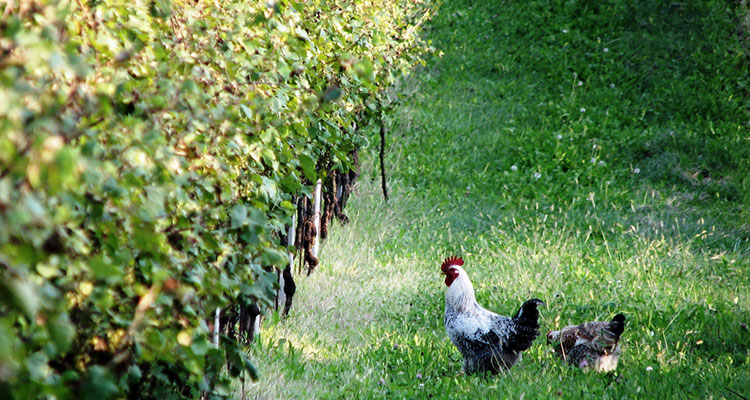The world seems to be shaking on its axis as it watches the new administration take a wrecking ball to the US. Not to mention forest fires destroying large tracts of the Chilean vineyard surface, and the rise of worrying post-Brexit extremism and racism all across Europe. And we narrowly missed a collision with a large asteroid. Again.
You could be forgiven for finding it facile to be talking about wine or wine producers in the wake of these events. Witness a small spat on twitter a few weeks back, with one very well established wine critic responding to another’s vaguely agit-prop tweets with the advice “Stick to wine – you’re wasting time.” Second said critic implied that being politically engaged at the present time was a necessity. I wouldn’t disagree; sometimes engagement and even radical acts are needed in troubled times. However, before we all put down our wine glasses and head for the streets, a reminder – the seemingly benign world of wine is not devoid of its own politics. Even wine can be radical.
Vine growing, indeed agriculture’s political axis in general intensifies around the thorny issue of so called “conventional agriculture” versus organic or biodynamic methodology. That word “conventional” is misleading, as it commonly refers to systems of farming that were popularised as recently as the 1960s – the use of synthetic pesticides, herbicides and fungicides and large-scale industrialisation of farming processes in general.
Growers who champion a return to more sustainable, pre-industrial farming methods – ergo organics and its more philosophical extreme, biodynamics – are performing a radical act. They dare to question that huge and increasing body of knowledge, encouraged and partly generated by the agrochemical industry, that the only efficient, sensible way to farm crops and produce food or wine is by the use of chemical enhancers, synthetic products and industrial processes.
The global food industry puts a significant effort into lobbying, propagating and reinforcing this message, scaremongering amongst farmers, vinegrowers and winemakers that if you don’t spray your vineyards, don’t add yeasts, don’t use DAP, don’t filter, don’t fine, don’t add liberal doses of sulphur, you’ll risk your livelihood and make terrible wine.
I speak to winemakers and oenologists on a regular basis who have bought into these myths. (I regard them as myths because the subtle and complex world of wine production is not black or white.) Further, a global culture of fine wine developed very ably before any of these supposedly essential practices. I’m not arguing for a luddite rejection of everything that modern science has taught us, rather, just that sometimes science only gives us part of the answer.
For example, it’s notable that even with the vastly superior knowledge available in the 21st century, the very finest food or wine is still invariably that which has seen the least intervention or “tweaking” to get it on the plate or in the glass. If we need to use science or chemistry to manipulate our nourishment, it’s usually covering up a lack of quality or some other defect. A casual look in any supermarket offers the proof: The most premium products are those based solely on a few raw ingredients – not those which are processed, or full of synthetic enhancers. Unfortunately, it’s close to impossible to apply this analysis to wine, which still doesn’t require an ingredients list to appear on the bottle.
Life isn’t easy for small wineries who choose the path of organic or biodynamic cultivation, and of minimal intervention in the winery (typically meaning no cultured yeasts, little or no filtering, little or no added sulphur dioxide). Standing up for what you believe in, swimming against the leviathan current of agribusiness, can come with a cost – of ridicule by your neighbours, or even litigation. Take the case of Emmanuel Giboulot, who in 2014 was taken to court for not spraying pesticides on his biodynamically certified vineyard (a course of action that would have cost him his Demeter certification). The clear message from his neighbours and the CIVB was clear: “We are right and you are wrong.”. Giboulot’s actions were radicalised.
Steffano Bellotti, owner of Piedmontese biodynamic estate Cascina degli Ulivi, mentioned in the film “Natural Resistance” that he pays fines of €150,000 a year to the Italian government for offences including referring to “natural wine” on his labels, and not obeying guidelines for which plants or trees should be planted on his estate. Bellotti is a vocal and staunch believer in low-impact, sustainable methods of farming, and ethics are clearly more important to him than money. Again, his acts are radical and political.
Politics enters the fray because of money. It could be said that wine growers who prioritise sustainability, who want to farm with the lightest possible hand are anti-capitalist. Everyone wants to survive financially, but for producers such as Bellotti – and there are many others like him – quality of life, ideals and the desire to be responsible guardians of the land is the prime focus. Not maximising profits or yields.
There is nothing more important than the sustenance and liquids which we put into our bodies. There’s no life without food, water and nutrition – and, arguably, no pleasurable life without wine. And there’s no wine without well tended land that will continue to support and nurture vines for many centuries to come. So the cause of growers such as Bellotti or Giboulot is well worth fighting.
I suggest therefore that supporting these producers, buying their wines and promoting their work is by extension its own small radical act. You may or may not be marching, but sometimes the vine can be mightier than the sword.
Featured image by Rising Damp

